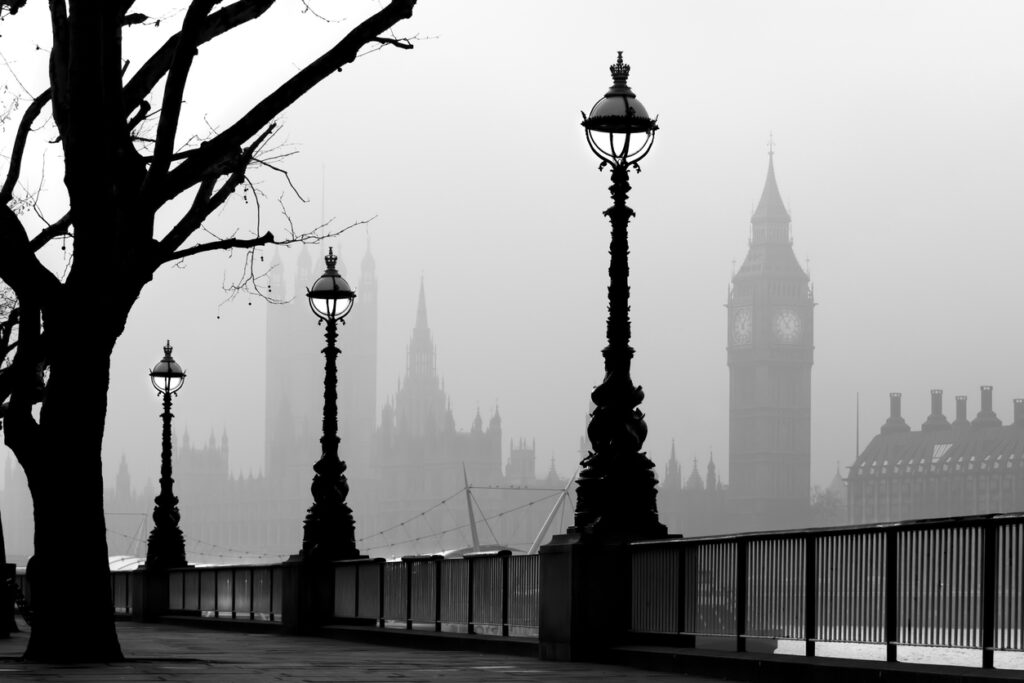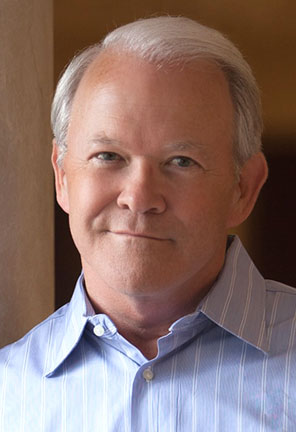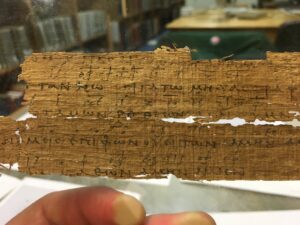

G.K. Chesterton called Charles Dickens the poet of fog.[1] In A Christmas Carol, the fog of London serves as a backdrop from which characters emerge with lamps, light.
When Scrooge is first greeted by the caroling of “God bless you merry gentlemen,” he responds such that “the singer fled in terror, leaving the keyhole to the fog.”[2]
Of the fog in Dickens, Chesterton remarks that fog is not used as dismal or dark, but rather something that draws in and, in the case of Scrooge, corners. Fog “makes the world small, in the same spirit as in that common and happy cry that the world is small, meaning it is full of friends.”[3] The fog of London brings Scrooge messengers and eventually sees him return to friends.
In this sense Chesterton picks up on the theme of comfort in Dickens. For comfort, he says, “belongs peculiarly to Christmas; above all it belongs pre-eminently to Dickens.”[4] The fog draws Scrooge inward to a place of comfort. For inside there are fires and feasts. Chesterton explains:
“The beauty and the real blessing of the story do not lie in the mechanical plot of it, the repentance of Scrooge, probable or improbable; they lie in the great furnace of real happiness that glows through Scrooge and everything round him.”[5]
In our day, we live in a fog. Current events and the conflict of culture pervade our streets and the airwaves in which we live and move. Yet, often when burdened by this fog and darkness we fail to see it as a reminder to move us to places of comfort. Places with fires and friends. Places that arrive naturally at this time of year.
George McDonald said Christmas Day is the “one day that blesses all the year.”[6] This is because at the heart of Christmas day is a message of comfort. Sung and proclaimed is a declaration of kingly coronation, the heralding of a kingdom that brings “tidings of comfort and joy.”
The promise of a Messiah-King came in a blessing from the patriarch Jacob to Judah that through him a king will reign (Genesis 49:10). Chris Bruno explains, “It was into this broken family line that God promised the scepter of kingship, the ruler’s staff. But the descendant of Judah would not only be the king of Israel, he would also be a king over the nations.”[7]
After hundreds of years, the people of God saw part of this prophecy fulfilled with the rise of King David about whom the prophet Nathan declares that the Lord “will establish the throne of his kingdom forever” (2 Samuel 7:13). Yet, this ruler revealed only, in part, what was yet still to come.
As Andreas Köstenberger reminds, “The Old Testament ends with the messianic promise unfulfilled,” and “The entire New Testament begins with a verse that declares Jesus to be the Son of David, the Son of Abraham, the long awaited Messiah!”(Matthew 1:1)[8]
Thus, when the angel of the Lord brought to the shepherds the “good tidings of great joy,” (Luke 2:10), they were marking the end of years of intertestamental silence about the coming messiah. Into the darkness of night emerged a lamp, a light. Jesus Christ came as King and reigns as King.
Pontius Pilate would ask Jesus about his monarchy and Jesus answered, “You say that I am a king. For this purpose I was born and for this purpose I have come into the world—to bear witness to the truth” (John 18:37).
This life, death, and resurrection of Jesus is what J. I. Packer calls the message of Christmas:
“The Christmas message is that there is hope for a ruined humanity–hope of pardon, hope of peace with God, hope of glory–because at the Father’s will Jesus Christ became poor and was born in a stable so that thirty years later he might hang on a cross. It is the most wonderful message the world has ever heard or will hear.”[9]
As a commentary for early Christians to understand this further, the author of the biblical letter to the Hebrews would connect the Old Testament prophecy about the Messiah-King to Jesus explaining that God the Father said of God the Son, “Your throne, O God, is forever and ever, the scepter of uprightness is the scepter of your kingdom” (Hebrews 1:8, Psalm 45:6).
And John declares Jesus is “the ruler of kings on earth” (Revelation 1:5). In our day, he rules at the right hand of the Father (Ephesians 1:20-23) though we do yet see “everything in subjection to him” (Hebrews 2:8).
Yet, though already reigning King, Jesus will come again to rule and reign in full. Into our world of darkness of fog, he will return and dwell with us and reign over us. Then “He will wipe away every tear from their eyes, and death shall be no more, neither shall there be mourning, nor crying, nor pain anymore, for the former things have passed away” (Revelation 21:4).
Just as Dickens used fog as a backdrop in which to drive Scrooge to light, friends, comfort — God uses the fog of darkness in our own day for good. Indeed, Chesterton’s final description of Dickens’ work serves as a fitting description of our own day, and our own future in Christ:
“The story sings from end to end like a happy man going home; and, like a happy and good man, when it cannot sing it yells. It is lyric and exclamatory, from the first exclamatory words of it. It is strictly a Christmas Carol.”[10]
The story of the reigning and returning Messiah-King, our Lord Jesus Christ is the Christmas Carol. May this bring tidings of comfort and joy, into the fog, this Christmas.
[1] G. K. Chesterson, Charles Dickens: A Critical Study (Dodd Mead, 1910), 169.
[2] Charles Dickens, A Christmas Carol (Puffin, 1843 [2014]), 13.
[3] Chesterton, Charles Dickens, 168-169.
[4] Chesterton, Charles Dickens, 165.
[5] Chesterton, Charles Dickens, 173.
[6] George MacDonald, Within and Without (Scribner, 1872), 125 cited in Timothy Larsen, George MacDonald and the Age of Miracles (IVP, 2018), 21.
[7] Chris Bruno, The Whole Story of the Bible in 16 Verses (Crossway, 2015), 52.
[8] Andreas J. Kӧstenberger and Alexander E. Stewart, The First Days of Jesus (Crossway, 2015), 38-39.
[9] J. I. Packer, “The Son’s Gift,” in Knowing God Through the Year (Hodder, 2017), 29.
[10] Chesterton, Charles Dickens, 173.
Editor’s Note: This article originally appeared at The Gospel Coalition. Used by permission from the author.






















